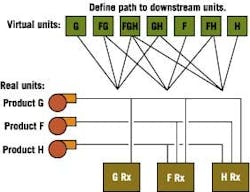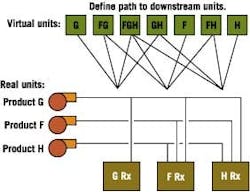Control Technology Boosts Specialty Chem Production
Global specialty chemicals company Cabot Corp. recently upgraded its treated silica operations in Tuscola, Ill., using the latest batch automation and control technology and installation expertise from Milwaukee-based Rockwell Automation. As a result of the upgrade, production increased by an estimated 30 percent.
"Under our old system, a large part of the manufacturing operation required operators to set up manual valves, enter setpoints and prepare pre-mixes by hand ," a process stuck in the dark ages by today's standards," says Todd Ray, senior process engineer for Cabot. "The process was also slowed by the use of dated PLCs. And we were concerned that we wouldn't be able to locate spare parts in the future, when they'll likely become increasingly hard to find."
Before asking Rockwell Automation to optimize its manufacturing process, Cabot considered several other options.
"Ultimately, we chose to go with Rockwell Automation because of its performance reputation, service expertise and its ability to standardize across operations, which helps us reduce overall costs," Ray explains.
Cabot opted to use Rockwell Automation's RSBizWare Batch and RSBizWare BatchCampaign software in tandem with Allen-Bradley manufacturing controllers.
In Cabot's operations, RSBizWare Batch automates batch management, as well as the loading of hundreds of instances of the same recipe onto the batch list ," minimizing the operators' roles in making critical batch decisions and mechanical equipment adjustments. In addition, the new software provides better batch records; the standard event log captures all significant activities during a batch and is easily configured to fit customized entries.
RSBizWare Batch also can provide efficient and predictable batch processing operation and consistency between batches and generate event information during batch runs. Its batch process management lets manufacturers reuse code, recipes, phases and logic between processes with similar procedures.
To get all of its operators and engineers up to speed on the batch technology, Cabot took advantage of a RSBizWare Batch training session. Cabot also signed a support contract with Rockwell Automation that allows the company to keep up with any RSBizWare Batch updates.
Virtual production units are tied to different downstream paths.
In preparing for the complicated upgrade to its production operations, Cabot also wanted to ensure systems would be in place to evaluate the upgrade's success. The new technology crossover involved three unit groups ," "G," "H" and "F" ," and occurred in three basic phases.
Phase one switched over the G units to the new control system while leaving the rest of the plant running on the old system. Operational disruption during the first phase lasted only eight days.
The second phase, switching over the H units, also went smoothly. Units using both manual and automatic control strategies were converted to fully automatic. But bringing the H units on-line presented a new challenge in batch software flexibility. Because some treated silica products are made in a limited number of units and other products involve all units, Cabot needed a system that could employ "virtual" units, which do not have any equipment or phases, as a place to define downstream units. The virtual units allow recipes to be equipment independent, so a single recipe can be bound to multiple units even if the units have dissimilar features.
Phase three, in which F units and the balance of plant and OEM equipment were upgraded, required a downtime of just six days. During this time, the outdated control system and older PLCs were decommissioned. In the place of old components, another group of units was brought on-line. Additional virtual units were created to allow paths to the newest units, as well as the units previously handled in phases one and two.
Cabot says that the results for its upgrade project were exactly as expected. The new control system started up with minimal production delay and delivered the throughput and accuracy improvements promised.
The three unit groups involved in the upgrade have seen a throughput increase of as much as 30 percent.
Cabot also experienced additional benefits from the upgrade. Production record-keeping, for example, is more accurate. Each batch creates an event file, which captures and time-stamps the events and the phase-generated snapshots of process variables. And Cabot's treated silica products have been more consistent since the upgrade because the new system enables operators to fine tune to reduce variability and keep abnormal situations under control. The new system also improves safety by providing better training through documentation and graphic capabilities.

